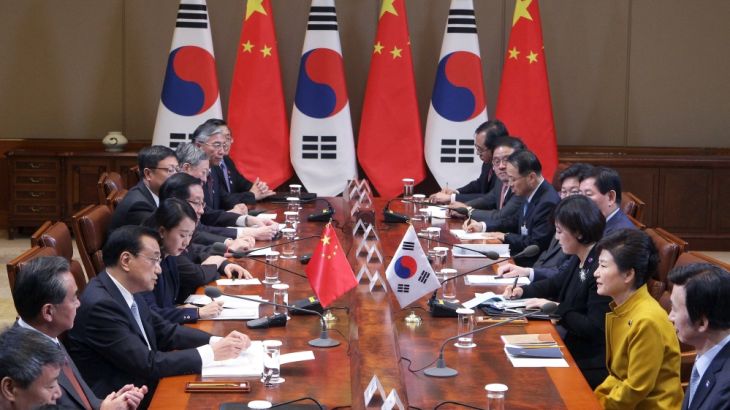Leaders of China, S Korea and Japan set to hold talks
Li, Park and Abe to meet in Seoul in effort to improve relations strained by territorial disputes and wartime history.

Li Keqiang, the Chinese premier, has arrived in Seoul for a three-way summit with South Korean President Park Geun-hye and Shinzo Abe, Japanese prime minister.
A day before the summit, aimed at repairing relations strained from historical and territorial issues, Park and Li were set to hold a separate meeting on Saturday with a possible focus on trade issues between two of the region’s closest economic partners.
Li might seek some sort of assurance from Park that South Korea, a key US ally, will keep a neutral stance over the recent flare-up between the US and China over the US navy’s freedom of navigation operations in the disputed waters of the South China Sea, analysts say.
Ties between South Korea and China have warmed considerably in recent years.
Park and Chinese President Xi Jinping have met on half-a-dozen occasions and are believed to enjoy good personal rapport.
Sunday’s trilateral summit will be the first since 2012.
The meetings were shelved after Japan’s ties with its two neighbours deteriorated over disputes arising from its wartime aggression and territorial claims.
Park-Abe meeting
Park will separately meet Abe on Monday in the first formal bilateral summit in more than three years.
“There’s much to be gained on the economic front, even the possibility of a future, three-way free-trade agreement,” Al Jazeera’s Harry Fawcett, reporting from Seoul, said on Saturday.
“But the focus is very much on what significantly will be just a brief, two-way meeting between Park and Abe.”
South Korea’s 60-year military alliance with the US remains the cornerstone of its national defence, and it does not want to become a pawn in the battle between China and the US for influence in Asia.
![S Korea and Japan have struggled to settle disputes arising from Japan's rule of the Korean Peninsula in the early 20th century [AP]](/wp-content/uploads/2015/10/42214060423d474698e47d68e93aede5_18.jpeg)
Japan and China have been gradually resuming exchanges following 2012 tensions over the control of disputed islands in the East China Sea.
The rift began healing after diplomats agreed to restart contacts last November when Xi briefly met and shook hands with Abe.
Park has met Xi six times since she took office in 2013 in efforts to further strengthen ties with China, South Korea’s largest trade partner, which also has leverage with North Korea.
However, South Korea’s ties with Japan have been persistently frosty after Abe came to power in December 2012.
South Korea and Japan have struggled to settle disputes arising from Japan’s colonial rule of the Korean Peninsula in the early 20th century.
‘Comfort women’ issue
South Korea’s so-called comfort women – the last survivors of the colonial Japanese military programme of coercing or tricking tens of thousands of young women into sexual servitude – gather every week outside the Japanese embassy in Seoul.
This week – in an apparent coincidence – a new “comfort women” statue was unveiled in Seoul, for the first time displaying a young Chinese victim alongside a South Korean girl.
Abe has said he is ready to discuss a wide range of issues, including the comfort women.
China has similar disputes with Japan.
However, the US wants Japan and South Korea to be on better terms to counter China’s growing geopolitical influence, including in the South China Sea and also to strengthen security cooperation against North Korea.
The US navy earlier this week sent a warship in its most direct challenge yet to China’s artificial island building that has upset other claimants in the South China Sea, including the Philippines, a close US ally.
China claims nearly all of the South China Sea, but the US says the waters are international territory and must be open for navigation.